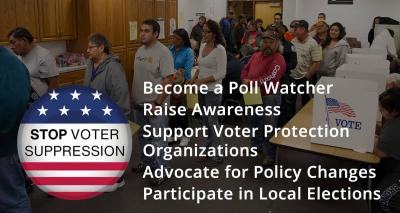Silencing the Ballot: The Struggle for Voting Equality

Composite image by Ending Racism USA; Photo of voters in line at an Arapaho polling station by Lindsay D'Addato, WyoFile via Flickr / CC BY 2.0 Deed
Throughout the United States, the legacy of voter suppression continues, casting a daunting challenge to the fundamental right to vote. While considerable progress has been made in the fight for equal voting rights, one harsh reality remains: Black and minority voters are still disproportionately affected by a range of voter suppression tactics.
Among the most notorious methods employed to stifle Black voters' voices are the strict voter ID laws, which necessitate specific forms of identification to cast a ballot. Advocates of these laws argue that these measures are essential to prevent voter fraud. However, the fact remains that these laws disproportionately affect minority communities.
Once such law implemented in North Carolina in 2013 was struck down by a federal court in 2016 after realizing how disproportionately it burdened Black voters.
Another tactic that has disadvantaged Black voters is the practice of purging voter rolls. These purges often result in the removal of eligible voters from the registration lists. In Georgia, during the 2018 midterm elections, then-Secretary of State Brian Kemp, who was also a gubernatorial candidate, oversaw the removal of over 340,000 voters from the registration rolls. This alarming number mainly targeted Black voters, raising significant concerns about the fairness of the process and casting a shadow of doubt over the election's integrity.
Another way that Black voters find their voices silenced is by reducing the number of early voting days. Early voting is crucial for those who may face difficulties getting to the polls on Election Day. In the 2020 election, Florida reduced the number of early voting days, disproportionately impacting communities with a substantial Black population. By curtailing these opportunities, the state erected yet another hurdle for minority voters.
One of the most tangible and impactful voter suppression tactics is the closure of polling places. In Texas, during the 2020 election, hundreds of polling places were abruptly shut down, and significantly, many of these closures were concentrated in predominantly Black and Hispanic communities. This led to longer wait times and increased congestion at the remaining polling locations, further diminishing accessibility for minority voters.
Georgia's 2020 election embodied the struggles Black voters have faced for years. In predominantly Black communities, voters faced excruciatingly long wait times. Legislation in Georgia prohibited any non-poll worker from distributing food or water to voters who fought against hunger, thirst, and resisting the call to nature for several hours while simply trying to exercise their right to vote.
Language barriers can act as yet another obstacle to voting, particularly in areas where English is not the first language for many residents. In South Carolina, in 2020, Federal Judge Mary Geiger Lewis ruled that the state violated federal law by failing to provide adequate language assistance for Spanish-speaking voters, making the electoral process less accessible to minority communities.
It’s evident that the fight for equal voting rights is far from over. Organizations like Ending Racism USA are committed to taking the actions needed to ensure that all citizens can exercise their fundamental right to vote without unnecessary barriers or impossible obstacles.
If you would like to join us, here are actions you can take:
- Become a Poll Watcher – Volunteer to monitor polling places and ensure fair treatment of voters on Election Day.
- Raise Awareness – Use your voice and platform to raise awareness about voter suppression issues. Share information, engage in discussions, and advocate for policies that protect voting rights.
- Support Voter Protection Organizations – Contribute to or volunteer with organizations that work to protect and expand voting rights.
- Advocate for Policy Changes – Contact your elected representatives to advocate for policy changes that remove barriers to voting, such as opposing restrictive voter ID laws and supporting legislation that expands early voting and safeguards against gerrymandering.
- Participate in Local Elections – Actively participate in local elections, where voting rules and procedures are often decided. Your involvement can help shape a more equitable voting environment at the community level.
